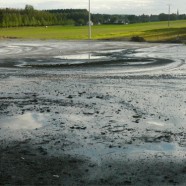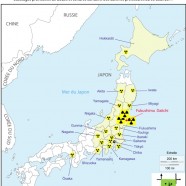Cover Your Eyes!
The 3D battle rages on. The manufacturers see it clearly. The future of the market of screens passes to 3 Dimensions and the journalists who serve as guinea pigs transmit to the consumer brief traces of dismay. The latest example is a special envoy of the newspaper Le Monde to the electronics convention IFA Berlin said after being positioned in front of a Toshiba 3D screen without glasses that “a blurry impression goes away when one turns the head”.
Following the request for an inquiry in February 2011 from Robin des Bois on the health and ocular effects in particular of the Nintendo 3DS (1), ANSES (2) and the NGO have estimated together that the questions concerning the potential health effects of this game console merit being asked to the entire line of 3D technology (cinema, television, cell phones…).
Life jacket for the French Ambassador in the Arctic
Once more, he could not say no to the invitation of a ship owner with a polar cruise. Michel Rocard, French ambassador for the Arctic and Antarctic poles embarks September 4th from Iqaluit in the Canadian arctic for eleven days aboard the Boréal.
This voyage is not without risks for the passengers and the environment. A year ago exactly, in the same waters, the Clipper Adventurer ran aground on a reef. The 197 passengers and crew members had to wait forty-eight hours on the ship, in distress, before beginning to be evacuated. Means of assistance and salvage from Canada like other coastal states of the icy Arctic Ocean are inadequate. The ship owner sued the Canadian government for mistakes in the mapping surveys. Today, only ten percent of the Arctic Ocean is correctly charted.
Life jacket for the French Ambassador in the Arctic
Once more, he could not say no to the invitation of a ship owner with a polar cruise. Michel Rocard, French ambassador for the Arctic and Antarctic poles embarks September 4th from Iqaluit in the Canadian arctic for eleven days aboard the Boréal.
This voyage is not without risks for the passengers and the environment. A year ago exactly, in the same waters, the Clipper Adventurer ran aground on a reef. The 197 passengers and crew members had to wait forty-eight hours on the ship, in distress, before beginning to be evacuated. Means of assistance and salvage from Canada like other coastal states of the icy Arctic Ocean are inadequate. The ship owner sued the Canadian government for mistakes in the mapping surveys. Today, only ten percent of the Arctic Ocean is correctly charted.
The waste from the Japanese earthquake and tsunami
1. Radioactive contamination
On 11 March 2011 there was a legal vacuum in Japan concerning radioactive waste resulting from a nuclear disaster. Current waste management Law places technical and financial responsibility for waste from natural disasters with local authorities. However, this excludes radioactive waste. The Law on rehabilitation of contaminated soil excludes from its scope radioactive soils and waste. The Law on the management of radioactive materials and waste only concerns those inside the nuclear plants.
The waste from the Japanese earthquake and tsunami
1. Radioactive contamination
On 11 March 2011 there was a legal vacuum in Japan concerning radioactive waste resulting from a nuclear disaster. Current waste management Law places technical and financial responsibility for waste from natural disasters with local authorities. However, this excludes radioactive waste. The Law on rehabilitation of contaminated soil excludes from its scope radioactive soils and waste. The Law on the management of radioactive materials and waste only concerns those inside the nuclear plants.












